Geneva Timber and Forest Discussion Papers
The objective of the Geneva Timber and Forest Discussion Papers is to make available to a wider audience work carried out, usually by national experts, in the course of UNECE/FAO activities.
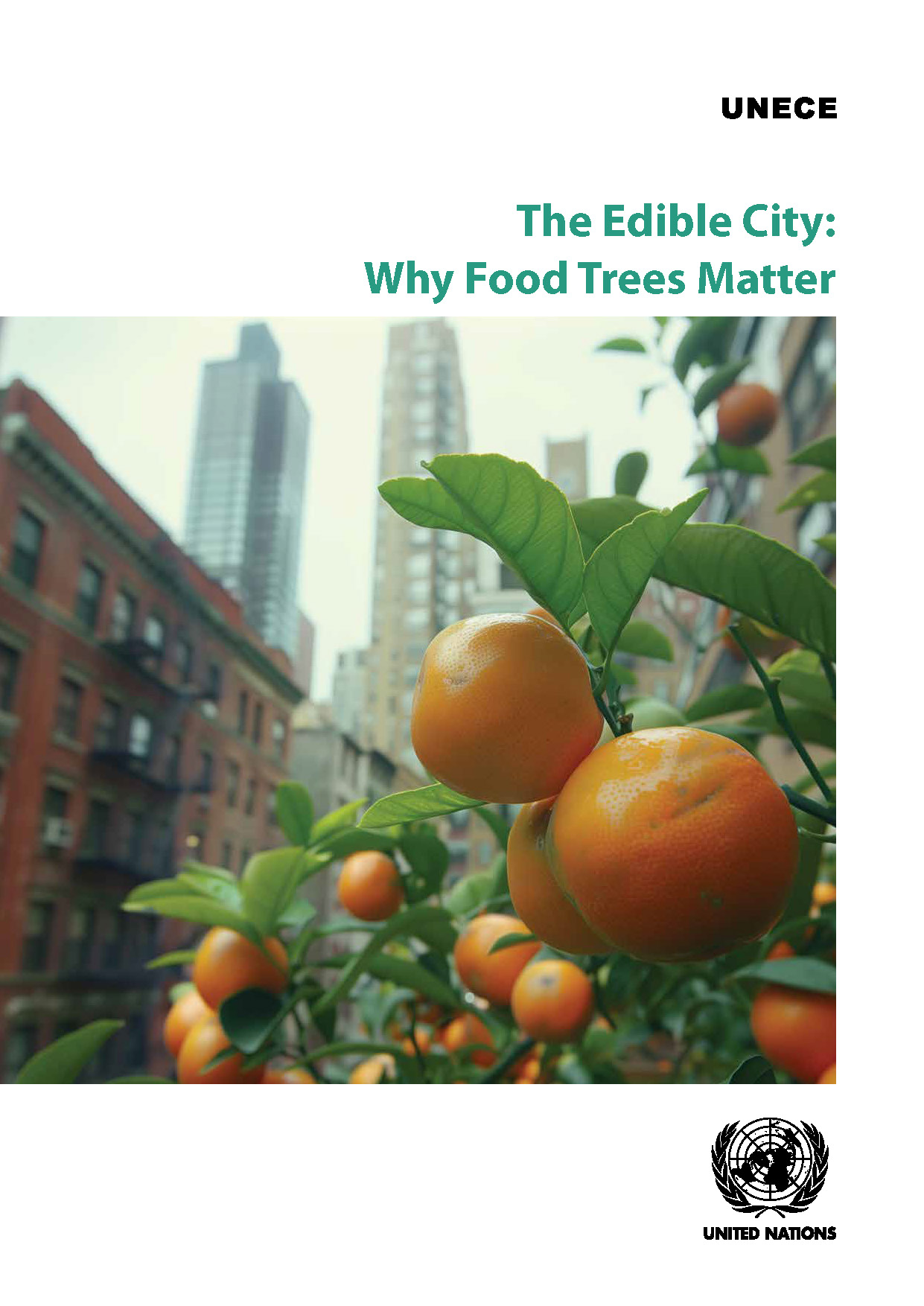
The Edible City: Why Food Trees Matter
More Than Just Shade: The Benefits of Nature-based Solutions for More Resilient Cities
This guide is designed to help local and national officials implement integrated nature-based solutions for enhancing food resilience in urban areas. By strategically integrating fruit-bearing trees, “food trees” into city landscapes, the guide promotes healthier, more sustainable, and shock-resistant urban ecosystems. While urban forestry and greening initiatives often focus on environmental, social, and economic benefits, the potential of productive trees in urban spaces to strengthen local food systems is frequently overlooked. These trees are often seen as more of a challenge than a solution, and this perception is reflected in urban planning and policies. Despite challenges related to governance, policy, space, and maintenance, these trees offer untapped potential for creating greener, more equitable cities. The guide's key focus is on developing methodologies to enhance food security through integrated solutions, while also exploring policy frameworks and practical steps for embedding food trees in urban environments. The practical and policy guidance provided in this guide is designed to support collaboration and planning efforts related to the integration of urban food trees. By fostering cross-sectoral collaboration, this resource is intended for policymakers, practitioners, and private sector entities involved in implementing advanced strategies and identifying best practices. The guide aims to facilitate the development of necessary policies and regulatory frameworks to drive progress in this area and establishing sustainable, resilient and food secure cities for all.
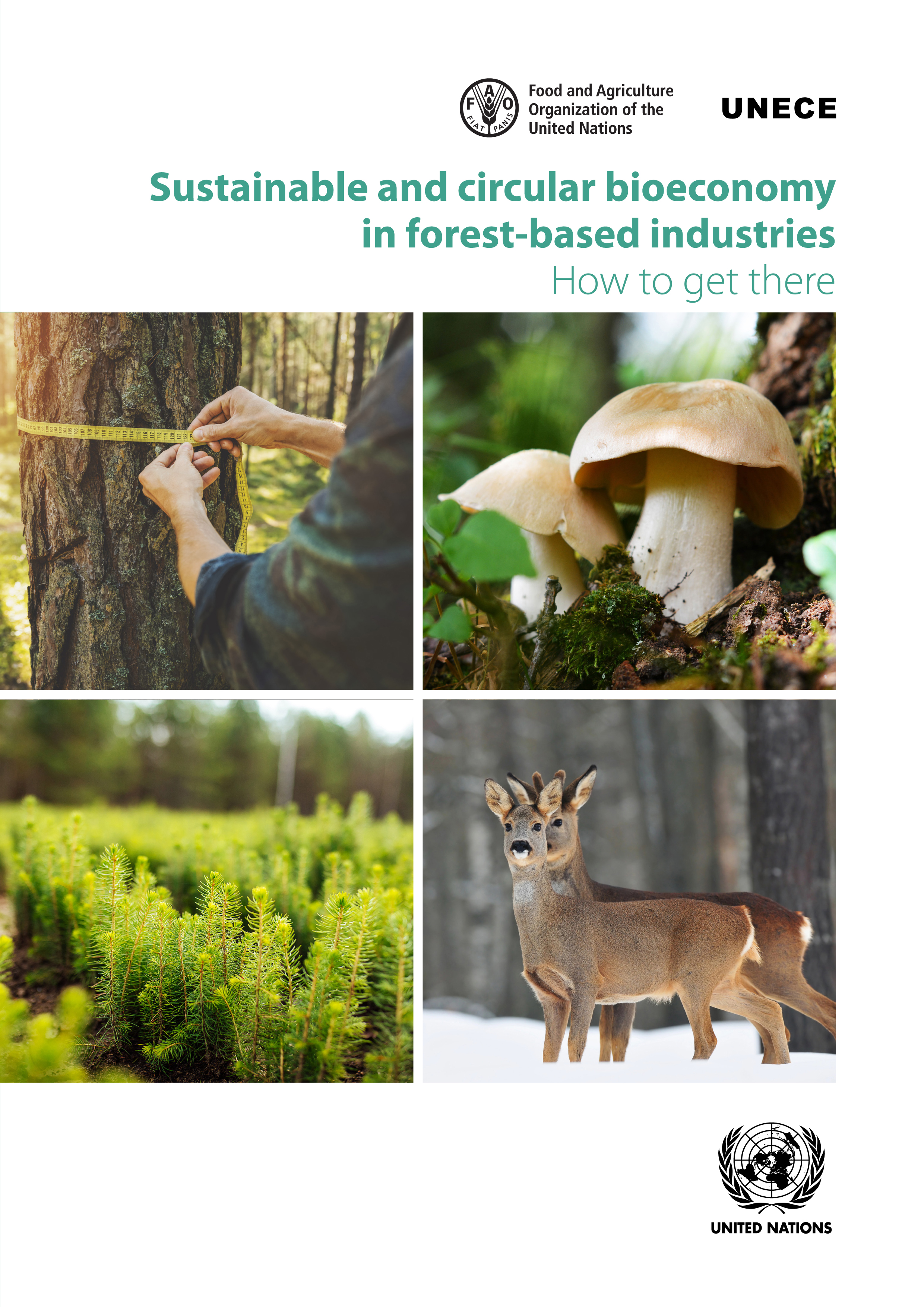
Sustainable and Circular Bioeconomy in Forest-based Industries: How to Get There
A sustainable and circular bioeconomy presents opportunities to improve climate change adaptation and resilience by promoting ecosystem restoration, nutrient and water retention in soils, supporting Indigenous People and local livelihoods based on biological products and services as well as building the conditions for more sustainably managed forests and fisheries. A transition to a sustainable and circular bioeconomy involves challenges and risks as well as benefits and opportunities. The potential trade-offs must be carefully considered and mitigating measures put in place to offset the negatives. Policy actions, partnerships and innovations are key tools to support a transition. While a transition to a sustainable and circular bioeconomy is a global goal, local production and consumption are key economic conditions to consider in achieving it. Local economies, green job opportunities and consumer interests should be supported and benefit from a transition. Forest-based materials are used for a wide variety of products in a circular bioeconomy and innovation continues to refine existing and develop new applications. The considerations addressed in this study include the growing demand for renewable forest-based raw materials and energy as well as the drive for a reduction in global reliance on fossil fuels. Additionally, there are considerations for climate change, pollution, and waste, as well as the phasing out of single-use and fossil-plastics, that create opportunities and challenges for the forest sector. To further support a sustainable and circular bioeconomy and the potential for a positive relationship with forests, public and private sector actors need to continue efforts that will effectively address the environmental, economic, and social aspects of a transition.
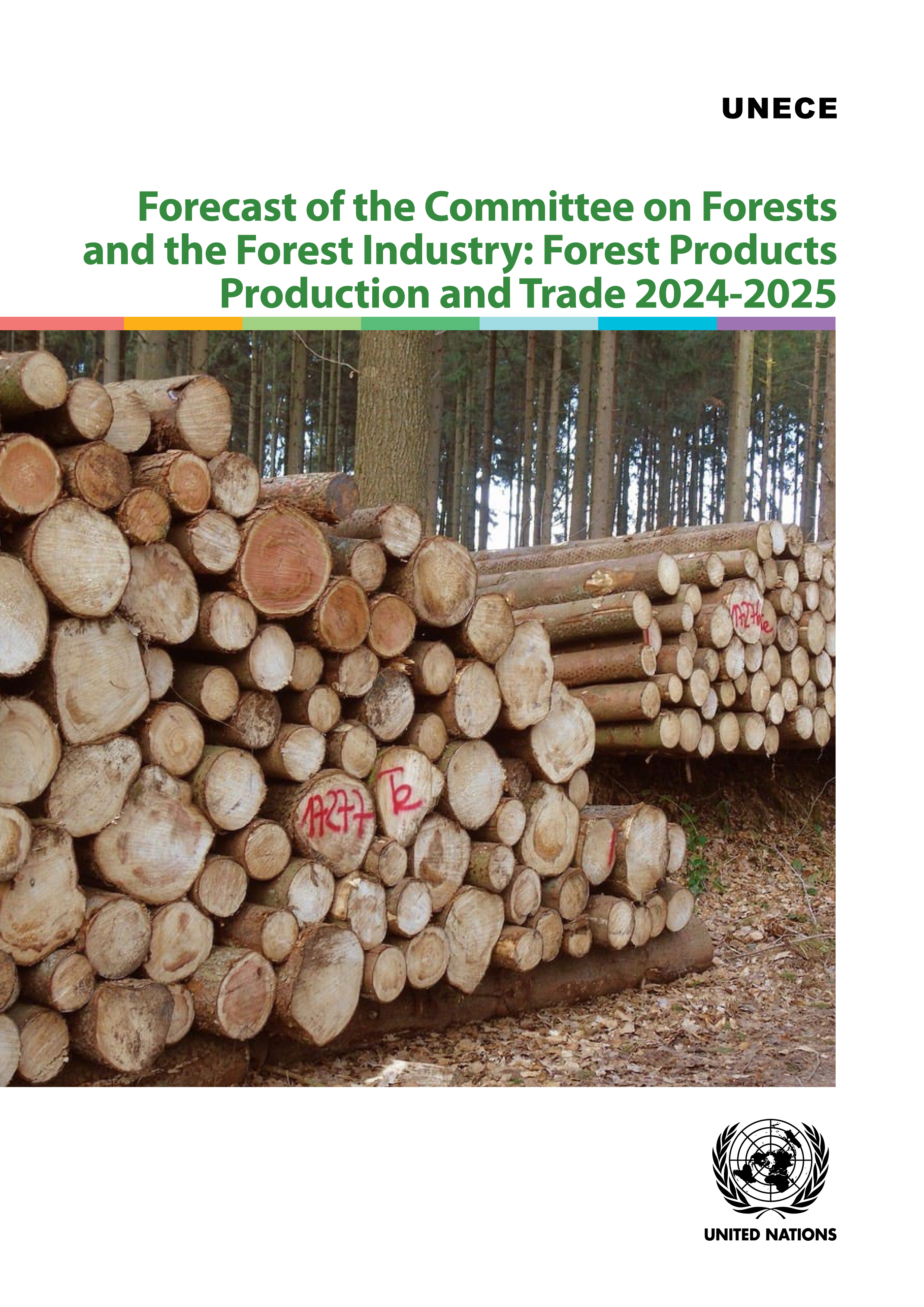
Forecast of the Committee on Forests and the Forest Industry: Forest Products Production and Trade 2024-2025
This publication is the statistical supplement to the 82nd session of the UNECE Committee on Forests and the Forest Industry about the current and next year's forest products markets. The tables in the publication show detailed forest products production and trade forecasts by country for 2024 and 2025. The tables are generated based on submissions by member States from Europe, North America and Eastern Europe, Caucasus and Central Asia. The tables presented cover roundwood (logs, pulpwood and fuel wood), sawnwood (coniferous and non-coniferous), wood-based panels (plywood, particle board, OSB and fibreboard), pulp, paper and wood pellets. The Committee collects data on over 30 individual products for many countries in the UNECE region.
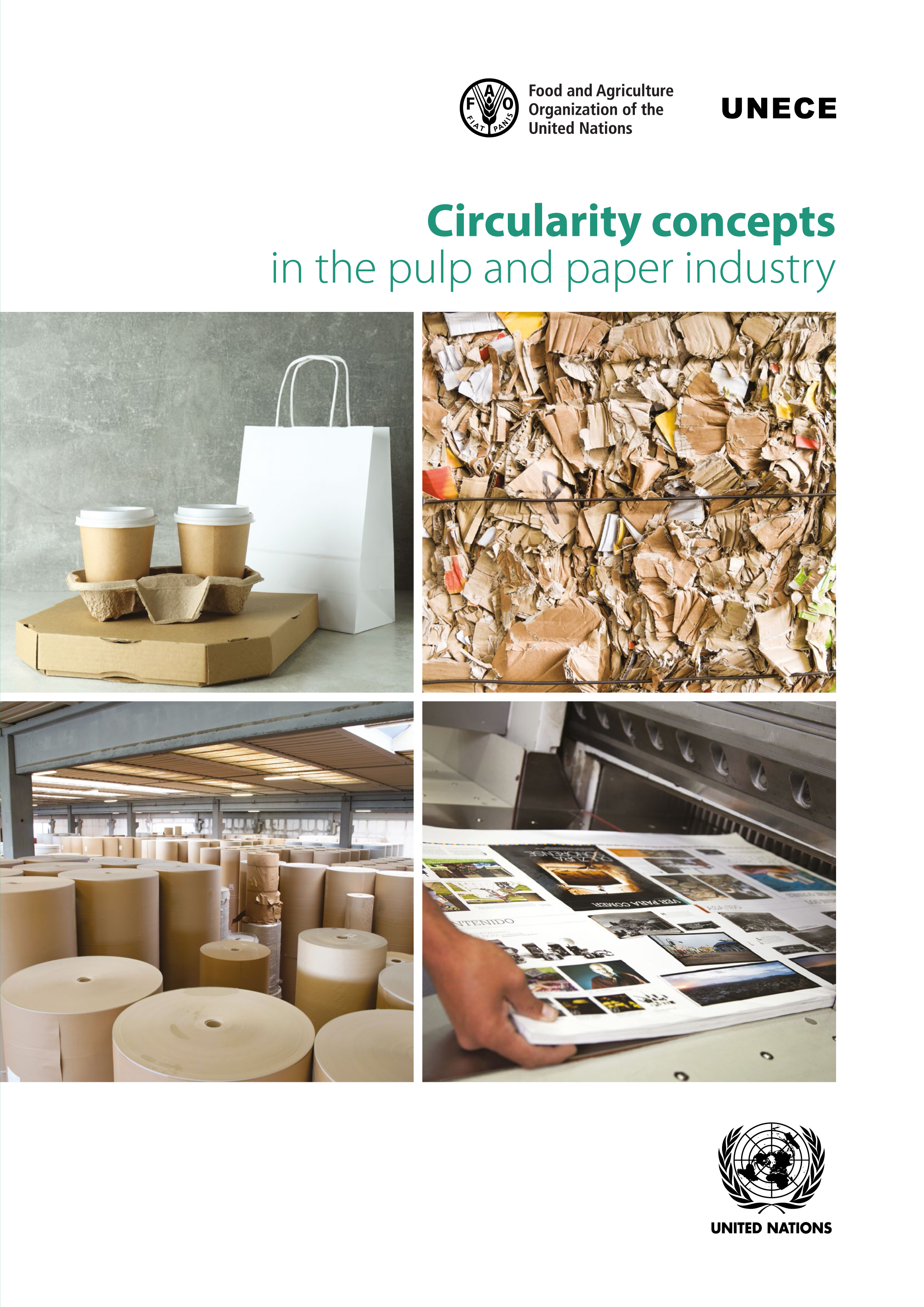
Circularity Concepts in the Pulp and Paper Industry
The circularity of paper and paperboard value chains is implemented principally thanks to the link between the design and production on the one hand and the use and end-of-life management on the other. As paper products become more complex and have to fulfil more functions, it is important that designers and producers of paper-based products are aware of the paper recycling process and contribute to high rates of and high-quality recovered paper allowing paper products to stay in the material loop. Various initiatives have been put in place in the pulp and paper value chain to ensure this objective and increase the circularity of paper-based products. However, the high rate of recycling is an achievement distinct from the pulp and paper industry among forest-based industries. The study describes the complexity of the pulp and paper industry with its different stages of raw material use, pulp and papermaking production processes and, finally, the trend to create higher-value products from side stream utilization. The study also gives the general industry context by describing an overall trend from a resource-intensive industry to one that has reduced its resource consumption, including through increased recycling rates over the last few years and the attention given to the optimization of water use and energy consumption. The design for the end-of-life valorization is equally important for all industries in the forest sector to successfully embrace circularity. However, in the pulp and paper industry, this important aspect of circularity has been realized as the high level of recycling is a prominent industry-wide feature. For this reason, this study places a particular focus on circular design and its interlinkages with the high level of paper recycling.

Detailed Methodology for the Preparation of the Forest Sector Outlook Study 2020-2040
The Forest Sector Outlook Study 2020-2040 (FSOS) for the UNECE region provides information that supports decision-making by showing the possible medium- and long-term consequences of specific policy choices and structural changes, using scenario analyses whenever possible. The study is the first to cover the entire UNECE region and provides results for the main UNECE subregions of Europe, North America and the Russian Federation. This Discussion Paper presents the detailed methodology that was used to develop the UNECE/FAO Forest Sector Outlook Study 2020-2040.
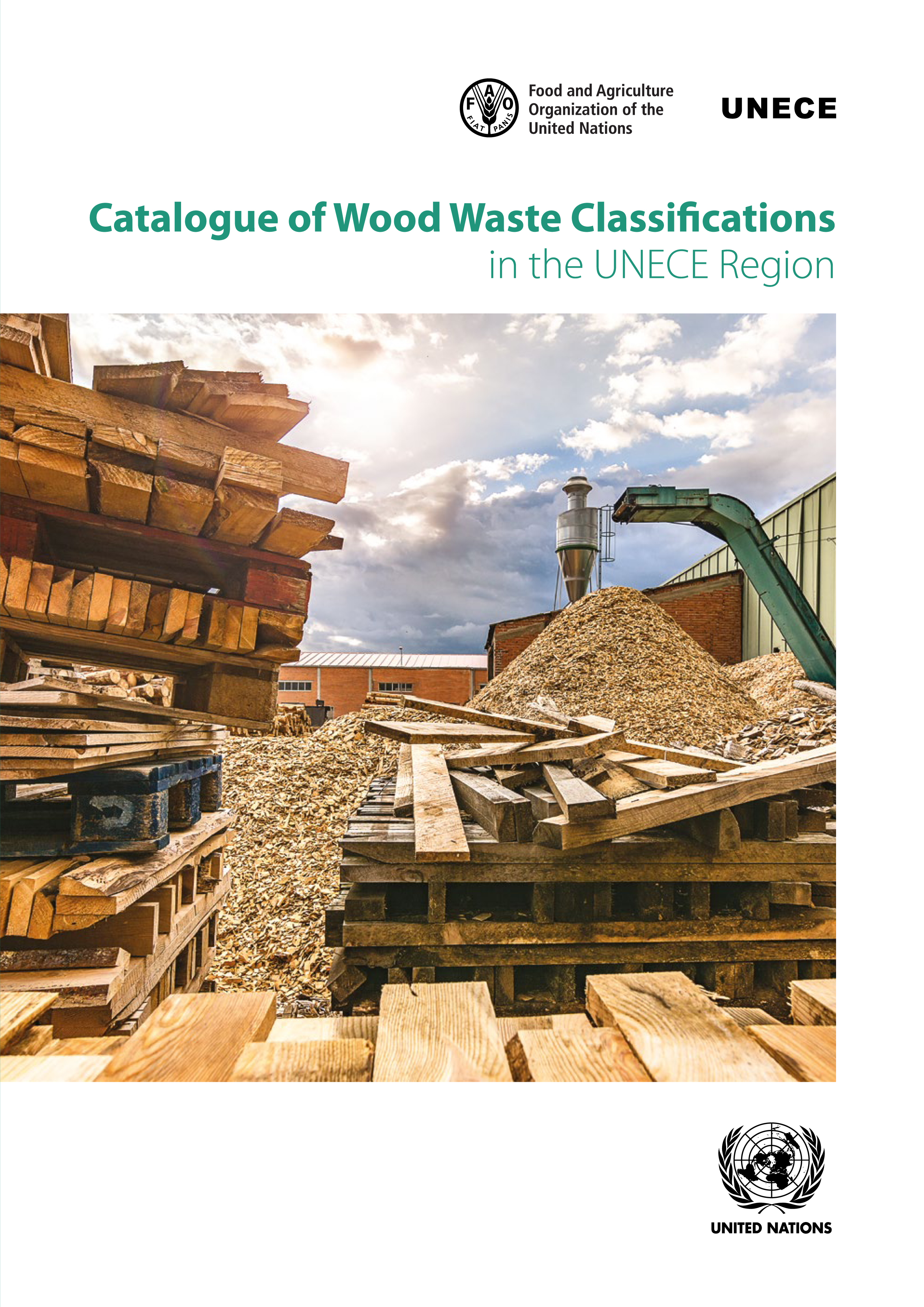
Catalogue of Wood Waste Classifications in the UNECE Region
The Catalogue of Wood Waste Classifications in the UNECE Region provides information about existing wood waste classifications developed by various international organizations and, at the national level, countries’ legal acts, statistical offices and sectoral non-governmental bodies. The information included can be useful in the development of a practical tool facilitating wood waste trade in the region.
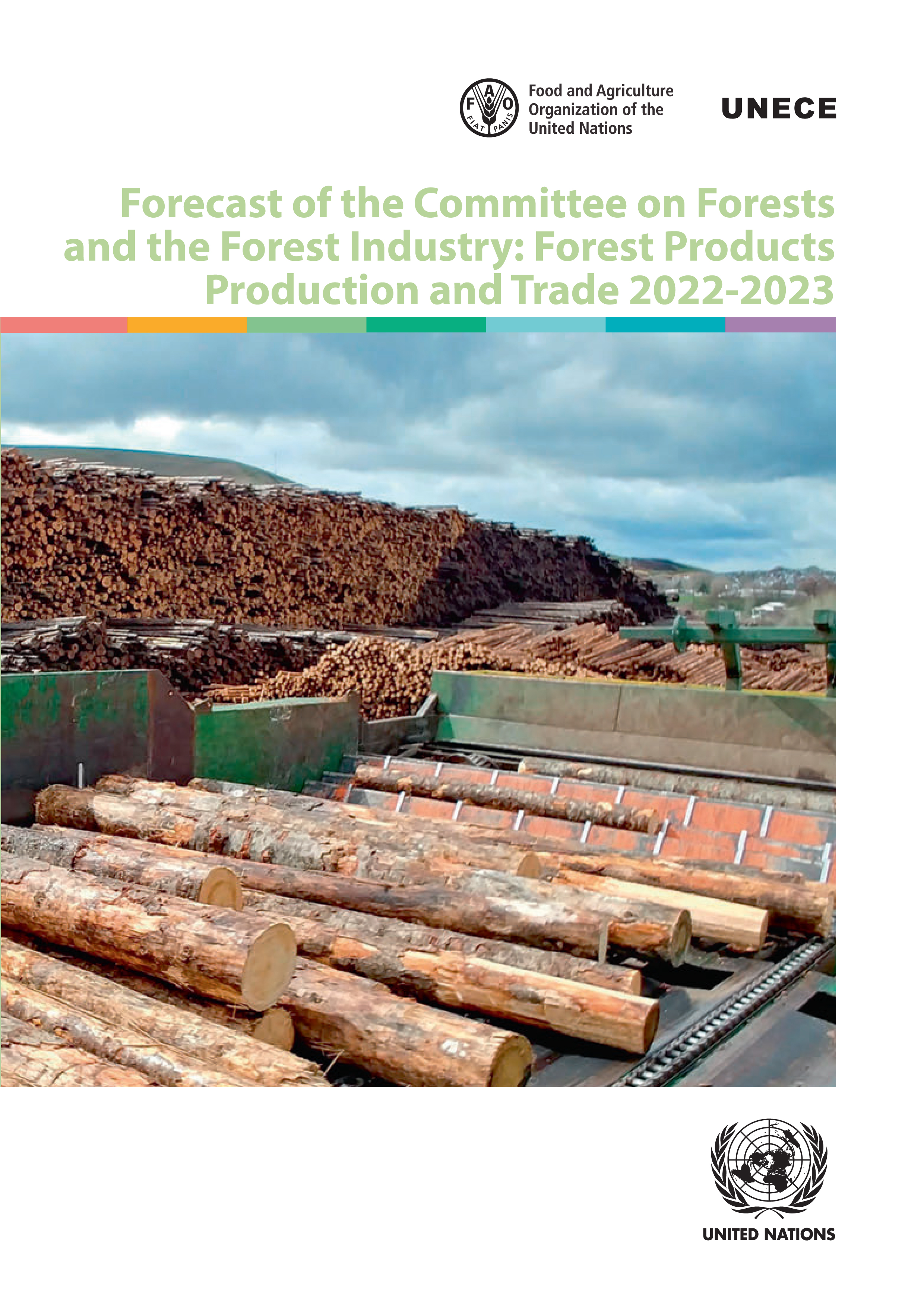
Forecast of the Committee on Forests and the Forest Industry
Forest Products Production and Trade 2022-2023
This publication is the statistical supplement to the official statement by the Committee on Forests and the Forest Industry about the current and next year's forest products markets. The tables in the publication show detailed forest products production and trade forecasts by country for 2022 and 2023. The tables are generated based on official submission by more than 20 member States from Europe, North America and Eastern Europe, Caucasus, and Central Asia. The tables presented cover roundwood (logs, pulpwood and fuel wood), sawnwood (coniferous and non-coniferous), wood-based panels (plywood, particle board, OSB and fibreboard), pulp, paper and wood pellets. The Committee also collects data on over 30 individual products for many countries in the UNECE region.
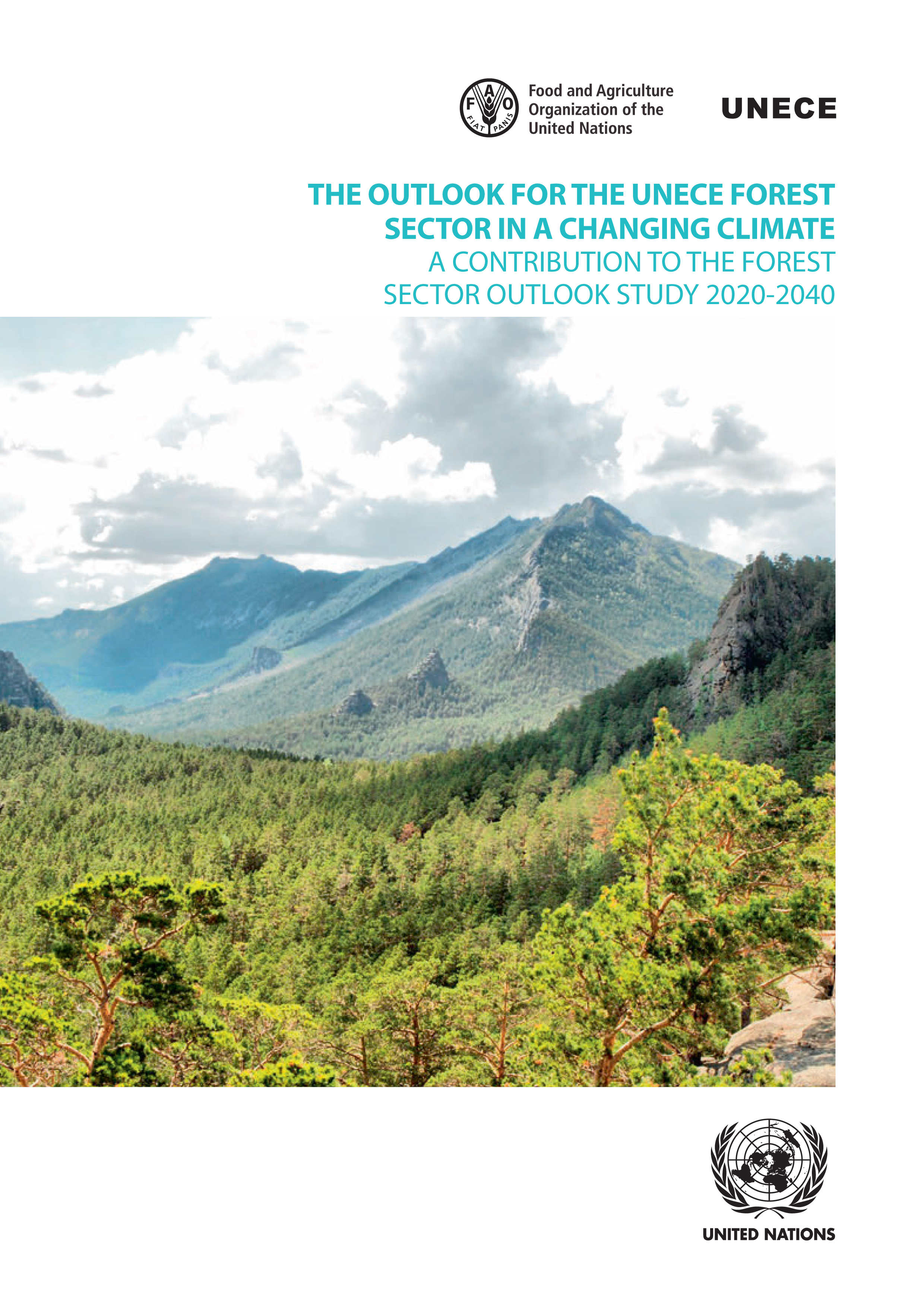
The Outlook for the UNECE Forest Sector in a Changing Climate
A Contribution to the Forest Sector Outlook Study 2020-2040
The Forest Sector Outlook Study 2020-2040 (FSOS) for the UNECE region provides information that supports decision-making by showing the possible medium and long-term consequences of specific policy choices and structural changes, using scenario analyses whenever possible. The study is the first to cover the entire UNECE region and provides results for the main UNECE subregions of Europe, North America and the Russian Federation. This Discussion Paper presents the detailed research, analysis and findings that were used to develop Chapter 4 of the UNECE/FAO Forest Sector Outlook Study 2020-2040. The study takes a pragmatic, transparent and objective approach to answering these key questions, sometimes using a modeling approach. It enables stakeholders to evaluate the long-term consequences of policy choices.
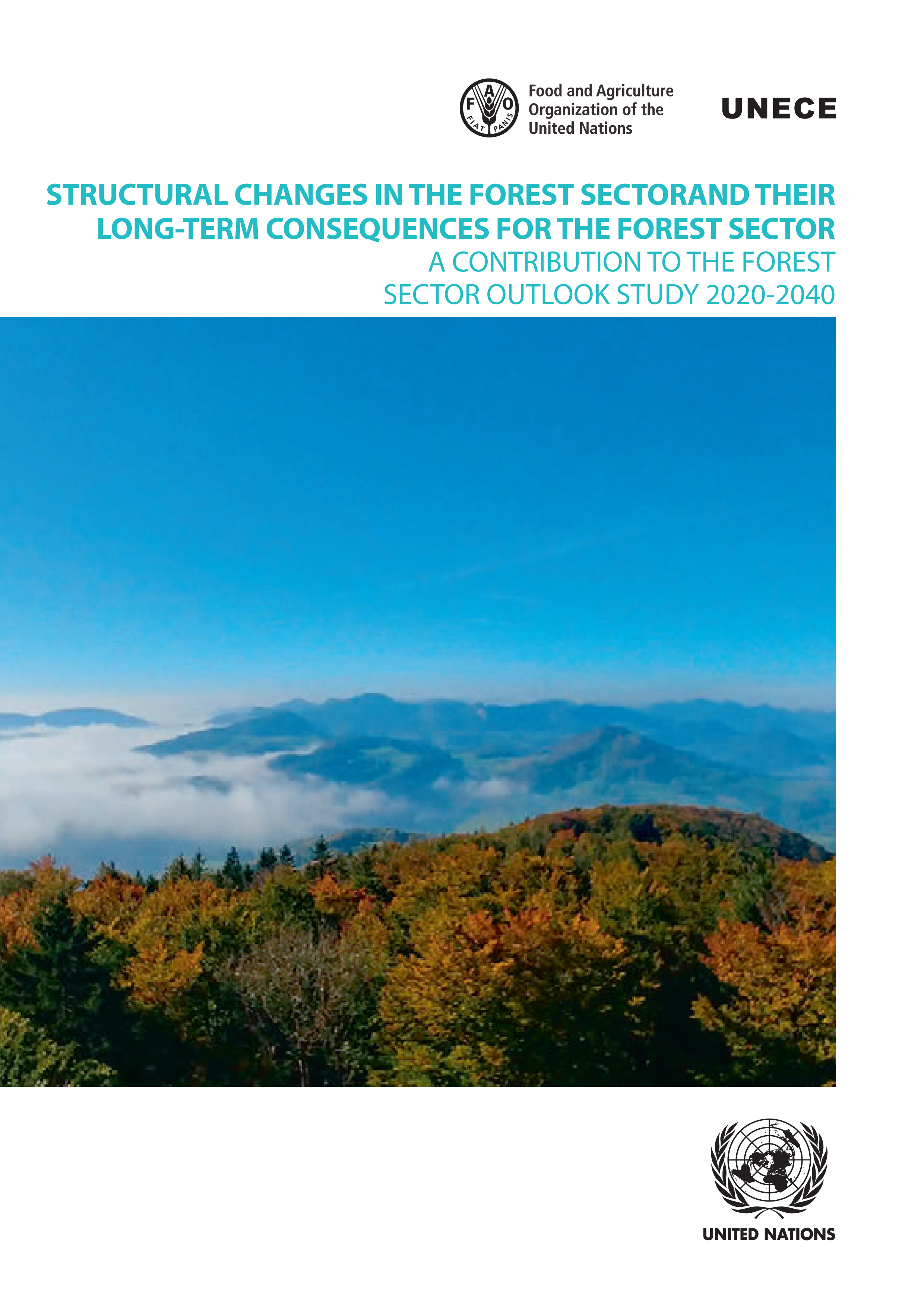
Structural Changes in the Forest Sector and Their Long-term Consequences for the Forest Sector
A Contribution to the Forest Sector Outlook Study 2020-2040
The Forest Sector Outlook Study 2020-2040 (FSOS) for the UNECE region provides information that supports decision-making by showing the possible medium and long-term consequences of specific policy choices and structural changes, using scenario analyses whenever possible. The study is the first to cover the entire UNECE region and provides results for the main UNECE subregions of Europe, North America and the Russian Federation. These supporting Discussion Papers contain information on the possible impacts of future trends regarding the future forest carbon sink in tonnes of CO2 equivalents, and on harvest, production, consumption, net exports and prices of wood products by 2040. The study takes a pragmatic, transparent and objective approach to answering these key questions, sometimes using a modeling approach. It enables stakeholders to evaluate the long-term consequences of policy choices.
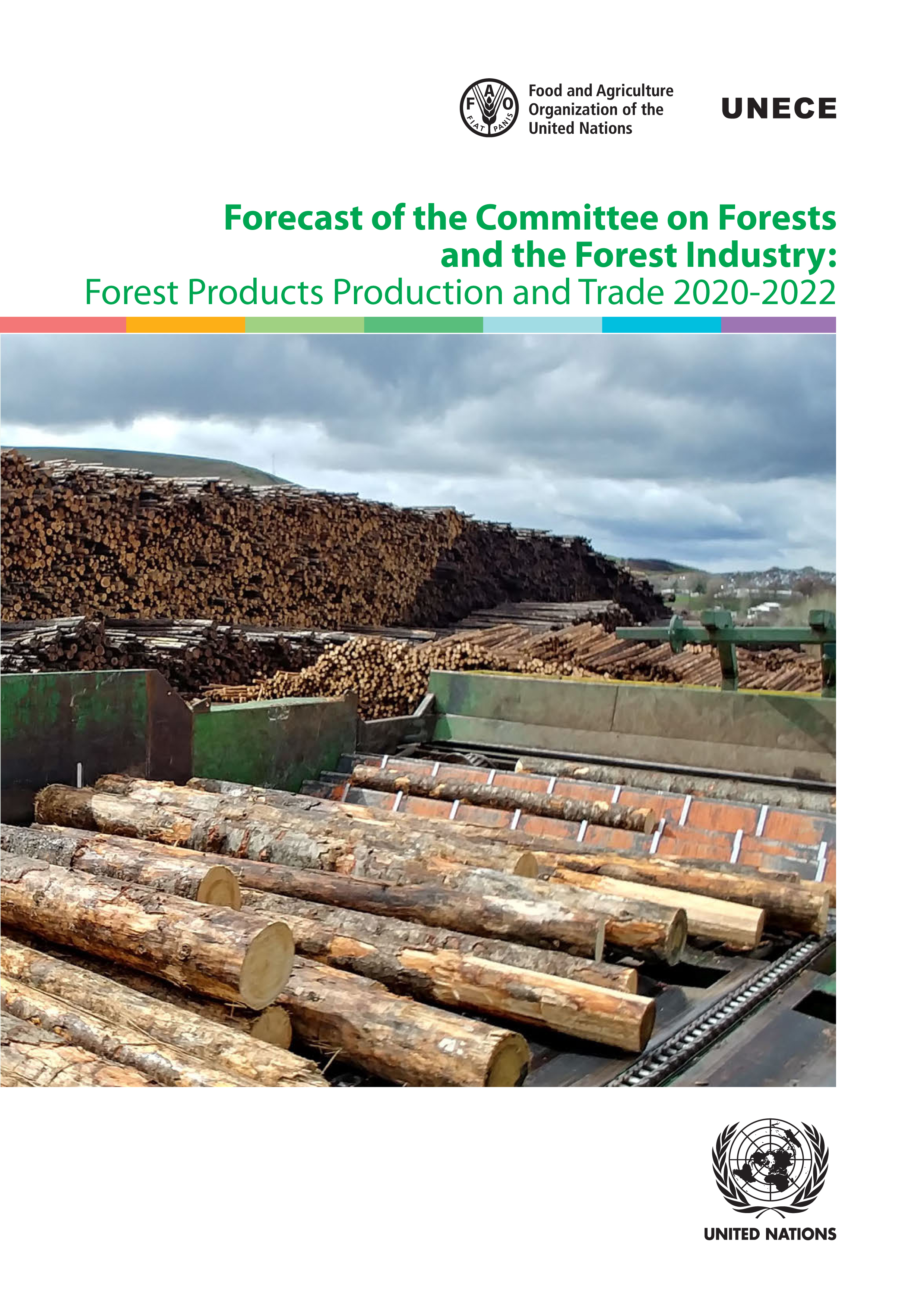
Forecast of the Committee on Forests and the Forest Industry
Forest Products Production and Trade 2020-2022
This publication is the statistical supplement to the official statement by the Committee on Forests and the Forest Industry about the current and next year's forest products markets. The tables in the publication show detailed forest products production and trade forecasts by country for 2021 and 2022. The tables are generated based on official submission by more than 30 member States from Europe, North America and Eastern Europe, Caucasus and Central Asia. The tables presented cover roundwood (logs, pulpwood and fuel wood), sawnwood (coniferous and non-coniferous), wood-based panels (plywood, particle board, OSB and fibreboard), pulp, paper and wood pellets. The Committee also collects data on over 30 individual products for many countries in the UNECE region.
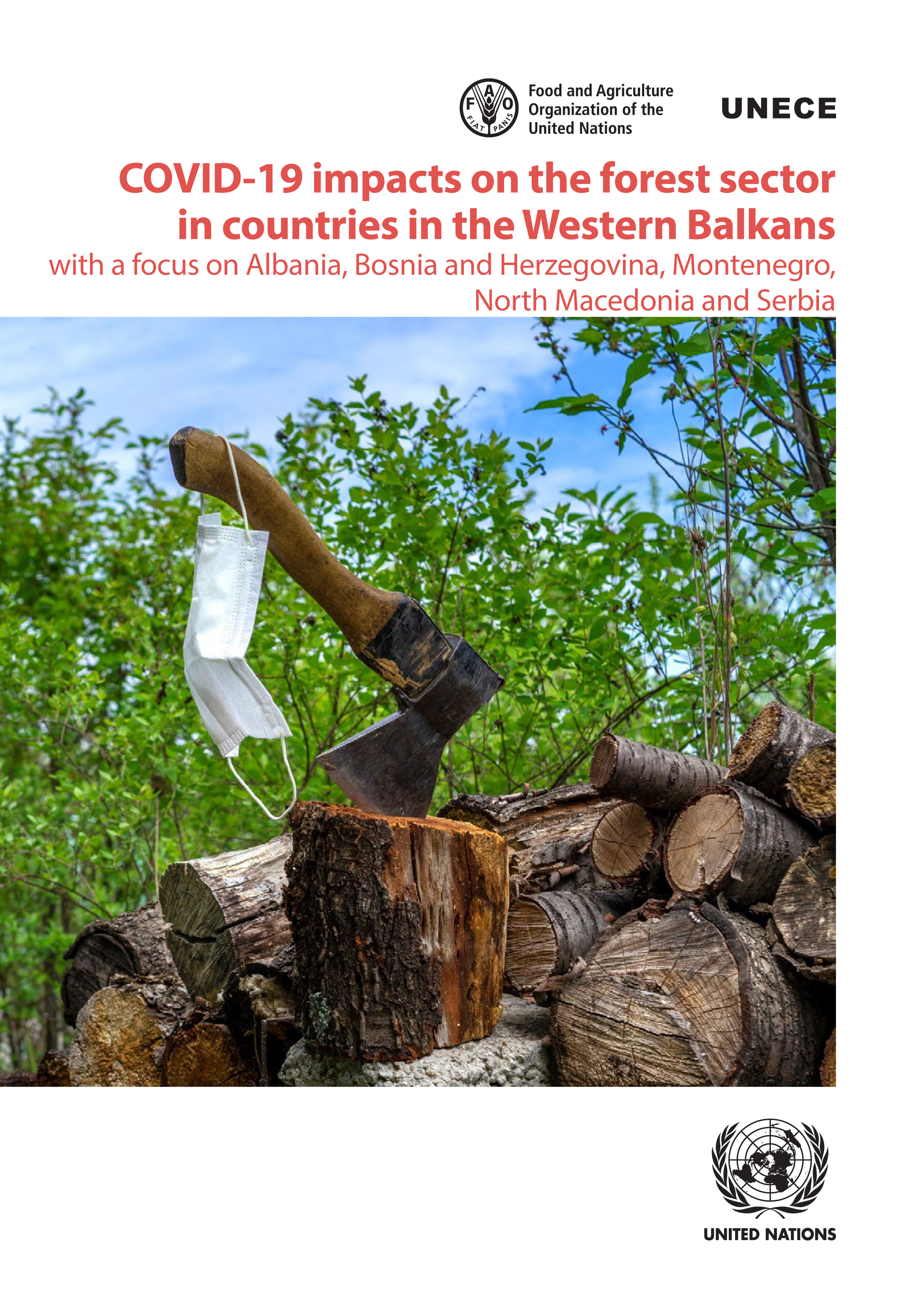
Covid-19 Impacts on the Forest Sector in Countries in the Western Balkans
With a focus on Albania, Bosnia and Herzegovina, Montenegro, North Macedonia and Serbia
This report summarizes the impacts of the COVID-19 pandemic on the forest sector of countries in the Western Balkans (WB) (Albania, Bosnia and Herzegovina, Montenegro, North Macedonia and Serbia) during the first three quarters of 2020. It focuses on production, export, import, consumption, prices and employment of the main wood products: roundwood, sawnwood, wood-based panels, wooden furniture, paper and paperboards. It also covers recovery measures implemented by Western Balkan governments. This report employs economic indicators for the period January-September 2020, alongside data from various sources, such as official statistics, international data bases (COMTRADE, EUROSTAT, FAO, UNECE), domestic organizations, as well as interviews with forest products companies of all sizes, which were used for their views on the impact of COVID-19.
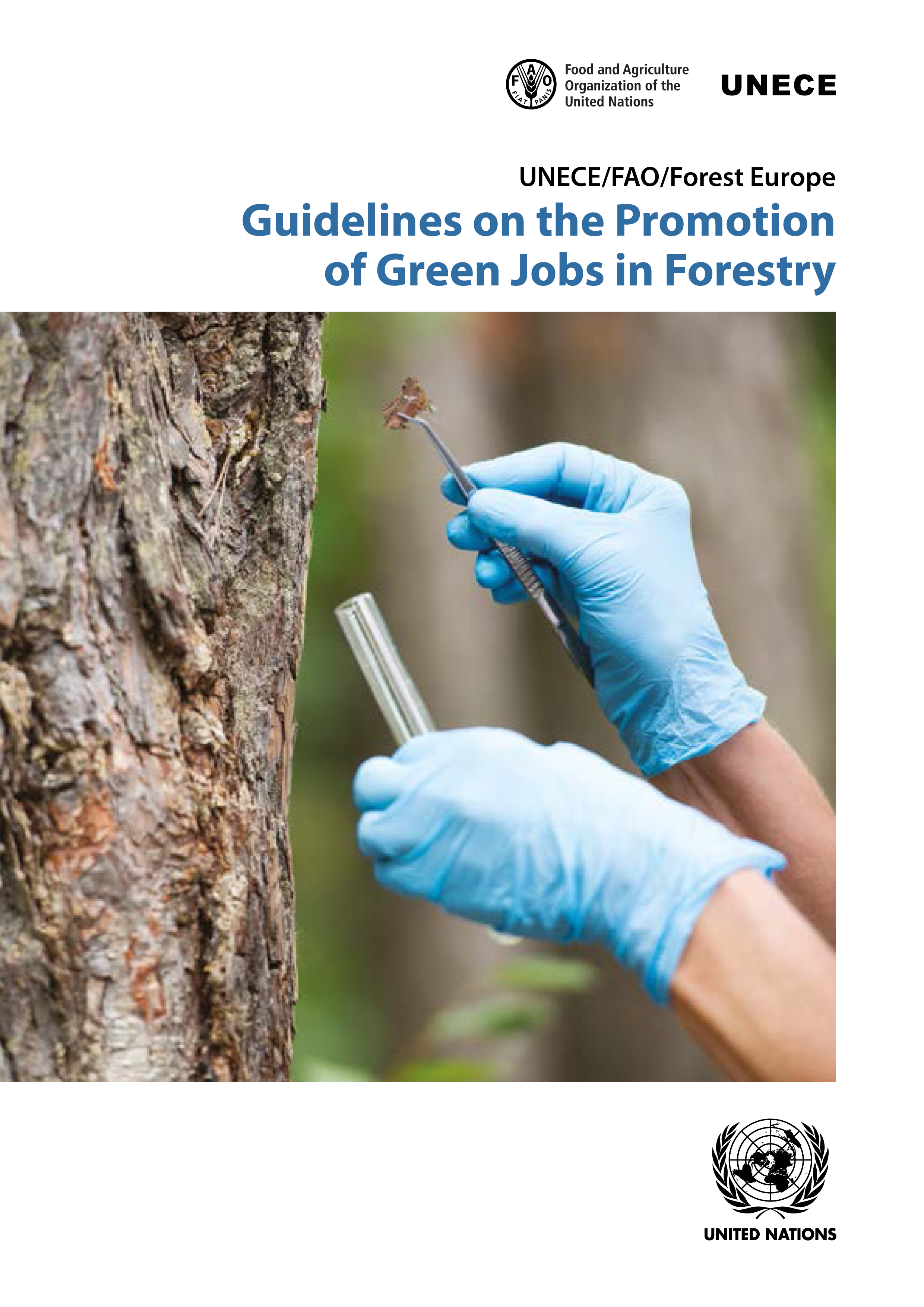
Guidelines on the Promotion of Green Jobs in Forestry
This publication is intended to assist stakeholders in the forestry sector to successfully navigate the transition to a forest sector that is fully engaged in the green economy. New and increasing opportunities for providing forest-based services and products, growing business and revenue as well as creating jobs arise from this transition. Application of the guidelines will assist in ensuring that the forestry workforce is fit for purpose and forestry is able to attract workers in the 21st century’s labour market.
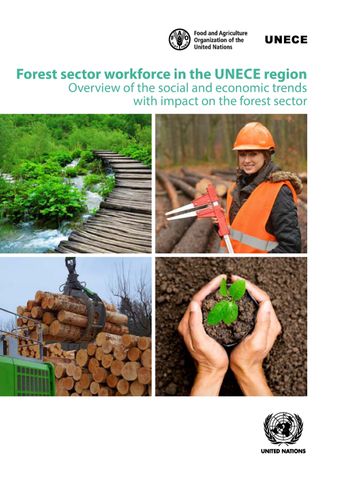
Forest Sector Workforce in the UNECE Region
Overview of the Social and Economic Trends with Impact on the Forest Sector
This study provides a comprehensive overview of the current state of the forest sector workforce in the UNECE region. It analyzes working conditions and occupational safety and health as well as the economic and social contexts that have led to structural changes in the sector, to the extent possible, through statistical data available at the regional level.. It links the statistics to wider research, conducted in a range of disciplines and contexts, which shed light on the causes of, and experiences with the changes in the sector and possible ways to make the forest sector more future-proof.
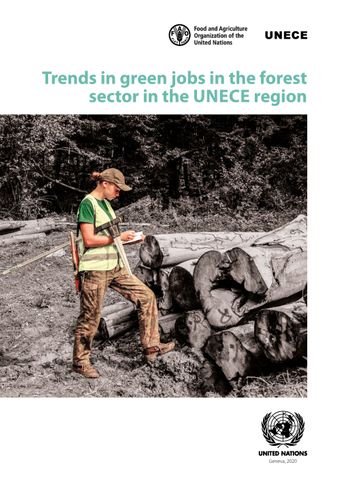
Trends in Green Jobs in the Forest Sector in the UNECE Region
This discussion paper includes a description of major transformation drivers of green jobs in the forest sector development, a mapping of (i) existing and emerging green jobs in the sector; (ii) skill requirements and; (iii) education needs for forest professionals in the UNECE region.
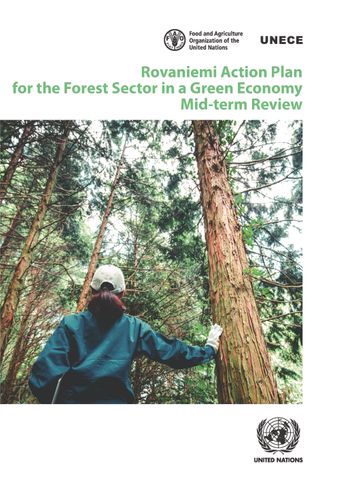
Rovaniemi Action Plan for the Forest Sector in a Green Economy: Mid-Term Review
This publication is a mid-term review of actions that have been implemented and are in line with the Rovaniemi Action Plan (RAP). Stakeholders of the RAP provided input and the Joint Section also reviewed its own activities. This study also contains a general review of actions reported during 2017 and 2018, as well as information gathered through the previous voluntary updates on the status of the implementation by the member States in 2014 and 2015.
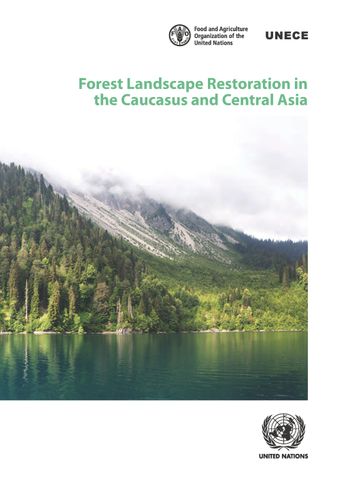
Forest Landscape Restoration in the Caucasus and Central Asia
Background Study for the Ministerial Roundtable on Forest Landscape Restoration and the Bonn Challenge in the Caucasus and Central Asia (21-22 June 2018, Astana, Kazakhstan)
This study, focusing primarily on the period from the collapse of the Soviet Union until the present day, identifies the key drivers of forest degradation and the potential for forest landscape restoration in the Caucasus and Central Asia. The study was undertaken to support the preparation of restoration pledges in the eight countries of the Caucasus and Central Asia in the run up to the Ministerial Roundtable on Forest Landscape Restoration and the Bonn Challenge in the Caucasus and Central Asia that took place in June 2018 in Astana, Kazakhstan. At this Roundtable Armenia, Georgia, Kazakhstan, Kyrgyzstan, Tajikistan and Uzbekistan committed to restore over 2.5 million ha of forest landscapes by 2030.
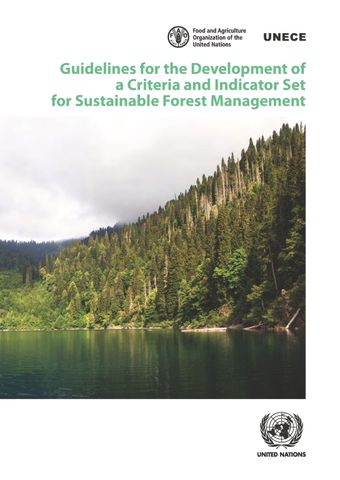
Guidelines for the Development of a Criteria and Indicator Set for Sustainable Forest Management
Criteria and indicators constitute an increasingly common policy tool to implement sustainable forest management (SFM) and to define clear priorities and targets. This should improve monitoring, reporting and assessment of key aspects of SFM performance. These guidelines provide specific concepts, definitions, tools and reference materials to guide the development process of national criteria and indicator sets for SFM. These guidelines have been developed to support the project “Accountability Systems for Sustainable Forest Management in the Caucasus and Central Asia” which is implemented through the UNECE and FAO Forestry and Timber Section and funded through the UN Development Account. The guidelines and the methods described within are used and applied for the development of national criteria and indicator sets for sustainable forest management in Armenia, Georgia, Kazakhstan, Kyrgyzstan and Uzbekistan. The guidelines might be also relevant for other countries.

Green Jobs in the Forest Sector
The study Green Jobs in the Forest Sector provides an overview of existing Green Forest Jobs and identifies possible areas for future activities and jobs in the forest sector, and may serve as starting point for further analysis and discussion on the future of Green Forest Jobs. It offers a framework for classifying Green Forest Jobs under seven thematic work areas, outlined in the seven main sections of the study, with a particular focus on major trends, needs and challenges as well as opportunities and prospects for the forest sector. The findings suggest that to promote Green Jobs in the forest sector it is key to: (i) look at forest ecosystem services management as the frame for Green Forest Jobs; (ii) recognize the progress made in the development of Green Forest Jobs and to identify avenues for the future; (iii) enhance the public perception of jobs in the forest sector; (iv) revise existing curricula and develop new ones for catering to the needs of the sector to close the skills gaps; and (v) to facilitate an inclusive transition to green economy through training and support.

Measuring the Value of Forests in a Green Economy
This paper presents green economy related definitions and concepts, and internationally developed assessment methods, notably natural capital accounting approaches, and in this way explore aligning forest sector approaches to those being used in wider contexts. It also proposes preliminary suggestions on how the forest sector’s contribution to a green economy could be measured.
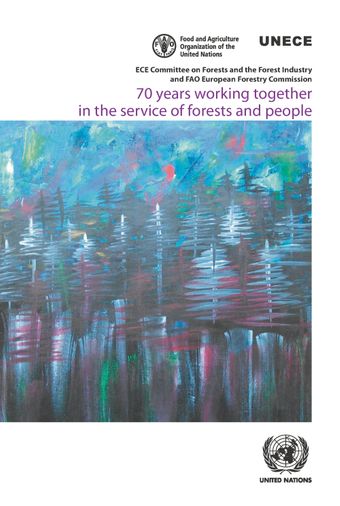
ECE Committee on Forests and the Forest Industry and FAO European Forestry Commission
70 Years Working Together in the Service of Forests and People
The ECE Timber Committee and the FAO European Forestry Commission emerged from the International Timber Conference held in 1947 as the key elements of the United Nations tasked with working on matters related to the forest sector in Europe. During their first 70 years of joint activity, the Committee and the Commission have contributed to post war reconstruction, to the expansion of the forest sector, to meeting the major challenges of the sector and to promoting and monitoring sustainable forest management. This paper chronicles the history of the Committee and the Commission’s work, in the context of the 2017 celebrations of the 70th anniversary of ECE and to mark the 70th anniversary of the fruitful cooperation of ECE and FAO on forests in the region.
